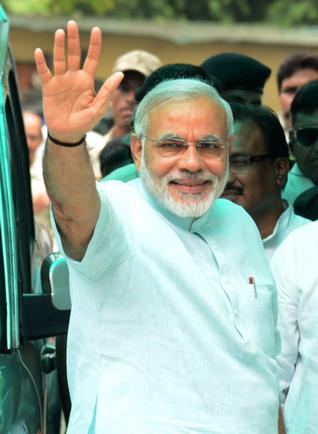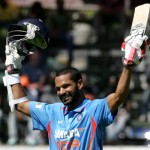 New Delhi, July 26;With his popularity shooting up almost four times in the last two years, and his competitors suffering a dip in ratings, Gujarat Chief Minister Narendra Modi has emerged as the top choice for India’s next Prime Minister. But in a direct face-off, the Congress vice-president, Rahul Gandhi, is only marginally behind Mr. Modi, while a large section of voters have not yet made up their minds. Strikingly, despite a dip in satisfaction levels with his performance, Prime Minister Manmohan Singh remains the most “liked” of politicians.
New Delhi, July 26;With his popularity shooting up almost four times in the last two years, and his competitors suffering a dip in ratings, Gujarat Chief Minister Narendra Modi has emerged as the top choice for India’s next Prime Minister. But in a direct face-off, the Congress vice-president, Rahul Gandhi, is only marginally behind Mr. Modi, while a large section of voters have not yet made up their minds. Strikingly, despite a dip in satisfaction levels with his performance, Prime Minister Manmohan Singh remains the most “liked” of politicians.
As India heads to elections, with the leadership question occupying centre stage, these are some of the major findings of the CNN IBN-The Hindu Election Tracker Survey, conducted by the Centre for the Study of Developing Societies (CSDS).
Modi, Gandhi, and others
When asked who they would like to see as their preferred prime minister after the next Lok Sabha elections, 19 per cent respondents chose Mr. Modi. Only 5 per cent had picked him in a previous poll in 2011, while this number was 2 per cent in 2009. In what ought to worry the Congress, while 19 per cent had chosen Mr. Gandhi as their preferred candidate in 2011, this has dipped to 12 per cent now. Only six per cent want to see Dr. Singh enjoy a third-term, while BJP senior leader, L.K. Advani gets the support of only two percent of the respondents.
But the good news for Mr. Modi comes with several caveats.
One, 39 per cent of voters did not offer an opinion on their choice for PM, indicating they had either not made up their minds or did not wish to share their view. This is a 14 percentage point jump from 2011, when only a quarter of respondents chose not to answer the question. These undecided/silent voters could form the core swing vote next year.
Two, in a direct face-off with Mr. Gandhi, Mr Modi retains an edge, but the margin is slim. 33 per cent respondents chose the Gujarat chief minister, while 31 per cent opted for the Congress vice-president. Women voters are divided in equal numbers between the two leaders. While Mr. Gandhi enjoys a decisive edge among Muslims, Scheduled Castes, and voters from South Indian states, Mr. Modi is ahead in the Hindi-speaking states and those regions which witness a bipolar contest between Congress and BJP. Mr. Modi’s support among Muslims has increased slightly in the past two years though, from two per cent to nine per cent.
Mr. Modi is also leading a party that no longer enjoys its reputation for “good leadership”. In 2004, 37 per cent respondents felt BJP provided “good leadership” as opposed to 31 per cent who thought this was the case for Congress. While the numbers for Congress have remained the same, it has dipped for BJP to 30 per cent.
And finally, on the issue of likeability, Mr. Gandhi enjoys a slight edge over Mr. Modi. 56 per cent ‘like’ the Congress leader, while 54 per cent like Mr. Modi.
Which leader is liked most?
The survey also broke down this question to judge attitudes at the state-level vis-a-vis state leaders. While Anna Hazare was the most liked in his home state of Maharashtra, among active politicians, 75 per cent of the respondents in Bihar liked Nitish Kumar. 65 percent in Delhi liked Arvind Kejriwal. Mr. Modi ranked third; with 64 per cent voters in Gujarat expressed a liking for him. Mr. Kumar is also the favourite for PM candidate for a non-Congress, non-BJP formation.
Evaluating Manmohan Singh
Despite facing relentless criticism and allegations of presiding over a corrupt regime, Dr. Singh is India’s most ‘liked’ politician, with 63 per cent voters expressing a view in his favour. After nine years in office, India’s most-educated Prime Minister is most likely to be remembered for his integrity. When asked what describes Dr. Singh best, 25 percent agreed with the assertion that he was an ‘honest PM’.
‘Honesty’, in fact, is the single-most important attribute voters are seeking. When asked to identify the one leadership trait they seek in their next PM, 29 per cent of the respondents selected this quality, as opposed to 14 per cent picking experience or 11 per cent selecting youth or a mere ten per cent choosing decisiveness.
But while that may explain Dr. Singh evoking continued respect, he does not have much else to cheer about. 49 per cent voters are now satisfied with his performance, as opposed to 56 per cent in 2011.
Is politics turning presidential?
In an indication of the larger direction of Indian political system, there is a general desire that parties project a PM candidate in the run-up to polls. 47 per cent respondents want parties to project a candidate before the polls, overturning the logic of the parliamentary system that elected representatives would chose a leader. 50 per cent Congress and 54 per cent BJP supporters share this view. 70 per cent Congress supporters say they will vote for the party if Mr. Gandhi is projected as PM, while 79 per cent BJP supporters say this for Mr. Modi.
But paradoxically, the party and the candidate are more important factors for voters in determining how they cast their ballot. 45 per cent say they will vote on the basis of the party, while 30 per cent say it will be based on the local candidate. Even among Mr. Modi’s supporters, the figures for 47 and 25 per cent respectively. This indicates that politics will remain local, voters are guided by complex motivations, and a direct face-off between two personalities cannot capture the diversity of Indian polity.

